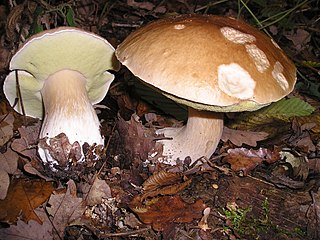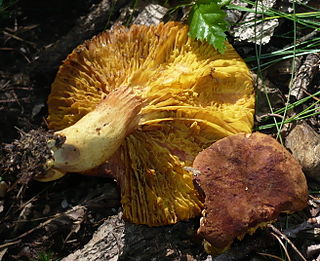
Bangladesh, officially the People's Republic of Bangladesh, is a country in South Asia. It is the eighth-most populous country in the world and is among the most densely populated countries with a population of nearly 170 million in an area of 148,460 square kilometres (57,320 sq mi). Bangladesh shares land borders with India to the north, west, and east, and Myanmar to the southeast. To the south, it has a coastline along the Bay of Bengal. It is narrowly separated from Bhutan and Nepal by the Siliguri Corridor, and from China by the mountainous Indian state of Sikkim in the north. Dhaka, the capital and largest city, is the nation's political, financial, and cultural centre. Chittagong, the second-largest city, is the busiest port on the Bay of Bengal. The official language of Bangladesh is Bengali.

A bolete is a type of mushroom, or fungal fruiting body. It can be identified thanks to a unique mushroom cap. The cap is clearly different from the stem. On the underside of the cap there is usually a spongy surface with pores, instead of the gills typical of mushrooms. However, there are some boletes that are gilled, such as species of Chroogomphus, Gomphidius, Paxillus, Phylloporus and Hygrophoropsis aurantiaca.

Sundarbans is a mangrove area in the delta formed by the confluence of the Ganges, Brahmaputra and Meghna Rivers in the Bay of Bengal. Sundarban Reserve Forest (SRF) of Bangladesh is the largest mangrove forest in the world. It spans the area from the Baleswar River in Bangladesh's division of Khulna to the Hooghly River in India's state of West Bengal. It comprises closed and open mangrove forests, land used for agricultural purpose, mudflats and barren land, and is intersected by multiple tidal streams and channels. Sundarbans is home to the world's largest area of mangrove forests. Four protected areas in the Sundarbans are enlisted as UNESCO World Heritage Sites, viz. Sundarbans West (Bangladesh), Sundarbans South (Bangladesh), Sundarbans East (Bangladesh) and Sundarbans National Park (India).

Xerocomus is a genus of poroid fungi related to Boletus. Many mycologists did not originally recognize the distinction between the two genera and placed Xerocomus taxa in genus Boletus. However, several molecular phylogenetic studies have demonstrated that Xerocomus is a heterogeneous genus of polyphyletic origin, which has resulted in further division of Xerocomus into Xerocomellus and Hemileccinum. The members of the genus Xerocomellus are more closely related to Boletus than true Xerocomus is, which is relatively distantly related to Boletus and more closely related to Phylloporus. Other former Xerocomus species have since been moved to Aureoboletus, Imleria, Hortiboletus and Rheubarbariboletus.
Gastón Guzmán Huerta, a Mexican mycologist and anthropologist, was an authority on the genus Psilocybe.

Phylloporus is a genus of fungi in the family Boletaceae. The genus has a cosmopolitan distribution, and contains about 50 species, mostly in tropical areas.

Phylloporus rhodoxanthus, commonly known as the gilled bolete, is a species of fungus in the family Boletaceae. Like other species in the genus, it has a lamellate (gilled) hymenium and forms a mycorrhizal association with the roots of living trees, specifically beech and oak in North and Central America.

Phylloporus pelletieri, commonly known as the golden-gilled bolete, is a species of fungus in the family Boletaceae.
Phylloporus novae-zelandiae is a species of fungus in the family Boletaceae. It was originally discovered in New Zealand in 1971.
Psiloboletinus is a fungal genus in the family Suillaceae. This is a monotypic genus, containing the single species Psiloboletinus lariceti, first described by mycologist Rolf Singer in 1938 as a species of Phylloporus. Alexander H. Smith disagreed with Singer's generic concept, concluding "No matter what disposition of the type species of Psiloboletinus is eventually made, it is evident that there are no clearly distinctive characters on which to recognize the genus on the basis of Singer's descriptions."

Modulus is a genus of small sea snails, marine gastropod molluscs in the family Modulidae.
Phylloporus alborufus is a species of fungus in the family Boletaceae. It was first described as a new species in 2010.
Phylloporus scabripes is a species of bolete fungus in the family Boletaceae. Found in Belize on sandy soil under Quercus spp. and Pinus caribaea, it was described as new to science in 2007.

Phylloporus arenicola is a species of bolete mushroom in the family Boletaceae. It is found in the Pacific Northwest region of western North America, where it grows in sand dunes in a mycorrhizal association with pine trees. It is one of only three North American Boletaceae species that occur in coastal sand dunes.

Phylloporus leucomycelinus is a species of bolete fungus in the family Boletaceae. First described in 1978, it is found in eastern North America and the Philippines.
Phylloporus gajari is a species of the fungal family Boletaceae. It was first described as a new species in 2015 from Bangladesh. This fungus is putatively associated with Shorea robusta.
Phylloporus attenuatus is a species of the fungal family Boletaceae. It was first described as a new species in 2017 from Bangladesh. This fungus is putatively associated with Shorea robusta.
Phloeonemus catenulatus is a species of cylindrical bark beetle in the family Zopheridae. It is found in Central America and North America.

Trochomodulus is a genus of small sea snails, marine gastropod molluscs in the family Modulidae.










